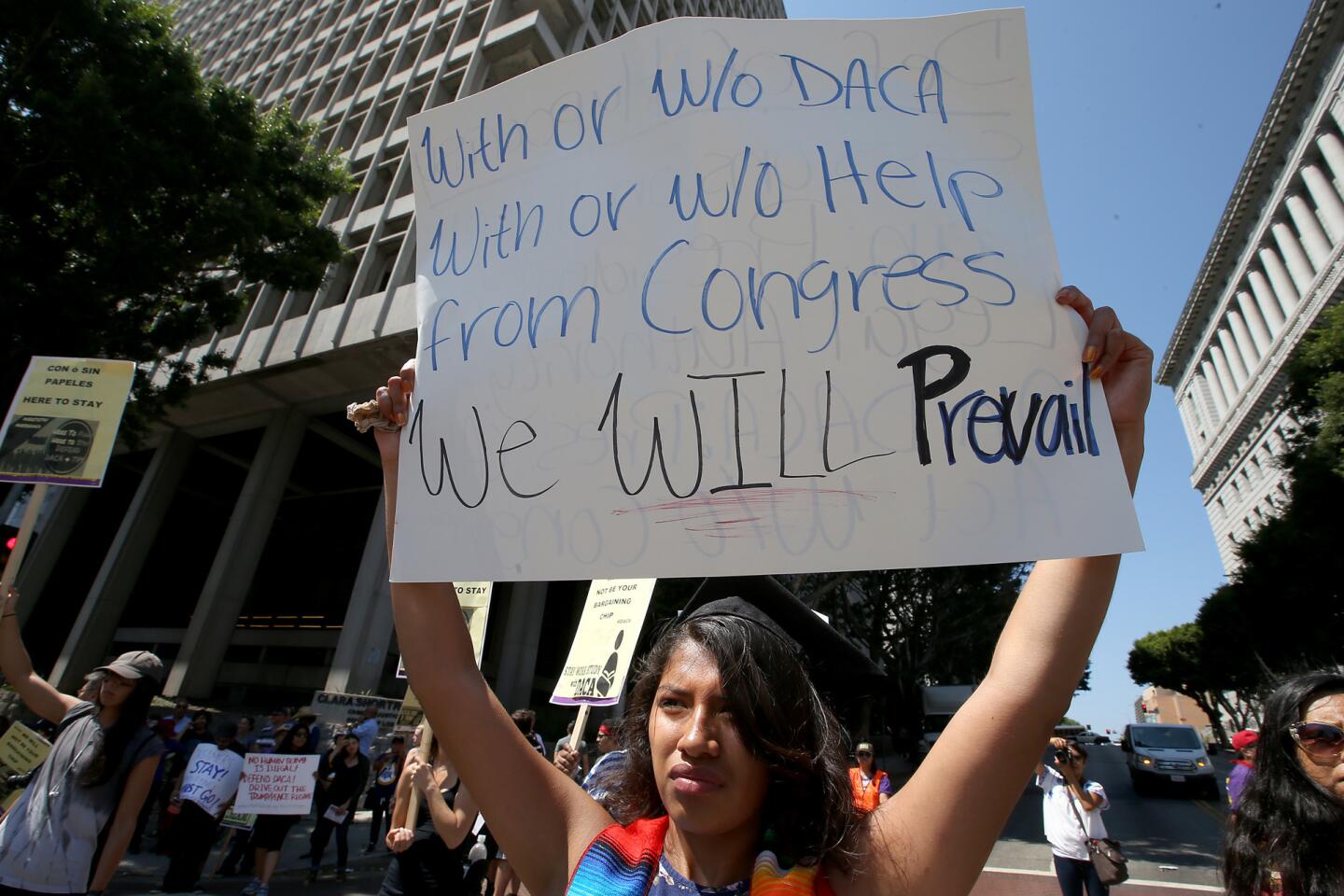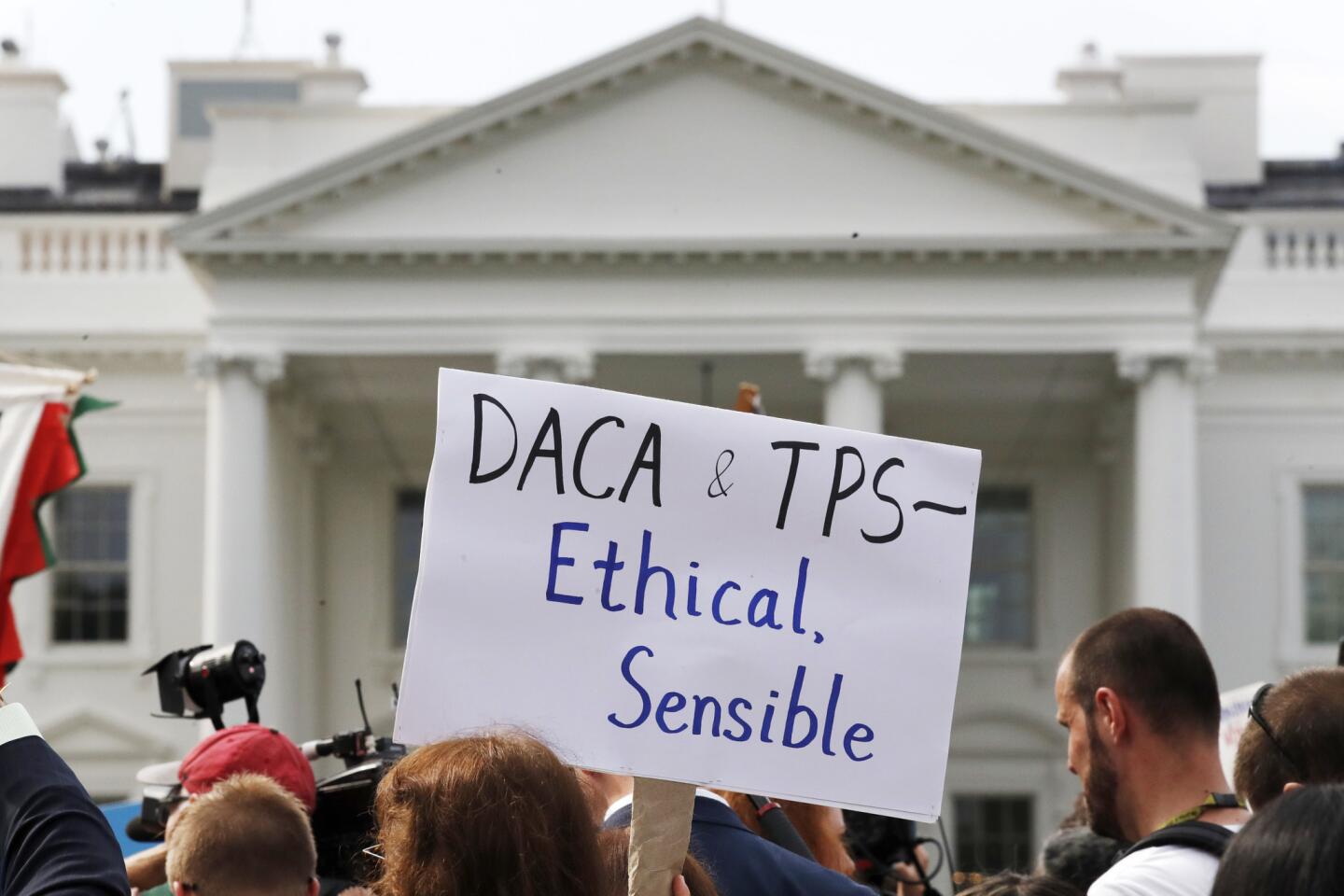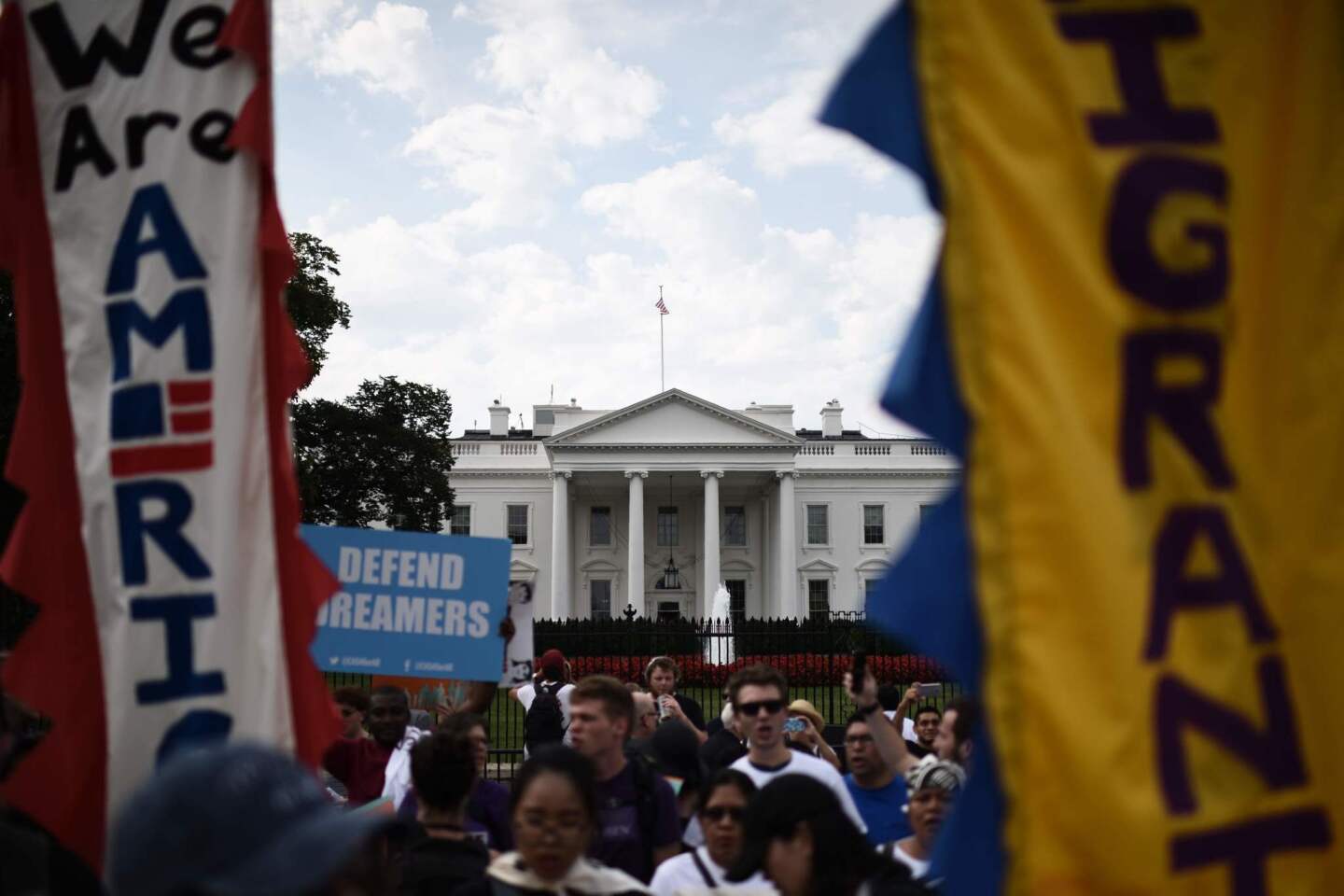Trump tells Congress to resolve fate of ‘Dreamers’ as he phases out their protections from deportation
Reporting from WASHINGTON — President Trump on Tuesday took action to strip away protections from deportation for roughly 800,000 people brought into the country illegally as children, giving Congress six months to write a law to resolve their plight.
Trump’s long-awaited decision to get rid of the Obama-era program for so-called Dreamers fit a pattern of his young presidency: As with other signature campaign promises on infrastructure, overhauling taxes and health insurance, he offered little guidance on what exactly he wanted done and left it to a polarized Congress to fill in the details.
For the record:
12:58 a.m. May 31, 2019An earlier version of this article stated that an executive from Cushman & Wakefield, a Chicago-based real estate firm, had signed a letter asking Trump not to end DACA. It was Cushman & Wakefield/PICOR, a separate real estate company based in Tucson.
If Congress fails, and the Dreamers are put in jeopardy of being deported to countries they know little of, if anything, Trump and some supporters have suggested the fault will be lawmakers’.
Trump did not announce the action, which is opposed by a majority of Americans, polls show. He left it to U.S. Atty. Gen. Jeff Sessions, a longtime anti-immigration advocate, to do so from the Justice Department. The president issued a written statement, though he later responded briefly, at an unrelated White House event, to reporters’ shouted questions.
“I have a love for these people and, hopefully, now Congress will be able to help them and do it properly,” Trump said of the Dreamers.
“And I can tell you,” he added, “speaking to members of Congress, they want to be able to do something and do it right. And really we have no choice. We have to be able to do something, and I think it’s going to work out very well, and long term it’s going to be the right solution.”
For Republicans in Congress, however, swiftly approving any immigration legislation is virtually impossible given the divisiveness of the issue within the party — as more than a decade of failed attempts has shown. Also, with the party in control of Congress, Republicans are struggling to advance a stalled agenda and must-pass budget bills with time running out for the year.
Late Tuesday, Trump seemed to accept the prospect that Congress might not be able to agree on legislation. “If they can’t,” he tweeted, “I will revisit this issue!” It was unclear what he meant by “revisit.”
Congressional Republican leaders, who met with Trump at the White House ostensibly about still-unwritten tax legislation, only tentatively committed to addressing Trump’s demand on immigration. House Speaker Paul D. Ryan expressed hope for a solution, and Senate Majority Leader Mitch McConnell said Congress “will continue working” on it.
The legislative uncertainty created by the president’s action translated to even greater personal uncertainty for the many people affected. Protests were immediate in cities nationwide.
Under Trump’s action, the Deferred Action for Childhood Arrivals program, commonly known as DACA, would continue to March 5. Unless a similar program becomes law, beginning in March, beneficiaries — at a rate of about 1,000 a day — would start losing their ability to lawfully hold a job, buy a home, go to college and receive student loans, or join the military. They would be liable to deportation.
Despite Trump’s expressions of love for Dreamers, in moving against DACA, he is fulfilling the promise to end it that he made — in much harsher terms — during his presidential campaign. The move advances his broader effort to ratchet up immigration enforcement and reduce the number of immigrants in the country.
In his statement, Trump said, “We must also recognize that we are a nation of opportunity because we are a nation of laws.”
Trump and his advisors, including Sessions in making the announcement, argue that reducing the ranks of low-skilled immigrants, legal and illegal, will raise wages and provide jobs for native-born Americans. Most economists, however, contend that reducing immigration will significantly hurt economic growth for years, especially given the aging of the native population.
President Obama, who created the program in 2012 out of frustration with Congress’s failure to act, offered rare public criticism of his successor in a lengthy post on his Facebook page.
Obama strongly disputed Republicans’ assertion that he exceeded his presidential power, writing that he relied “on the well-established legal principle of prosecutorial discretion, deployed by Democratic and Republican presidents alike” to set priorities for immigration enforcement.
He acted, he said, because Congress wouldn’t, and “it made no sense to expel talented, driven, patriotic young people from the only country they know solely because of the actions of their parents.”
The former president called Trump’s action “a political decision, and a moral question,” adding: “Ultimately, this is about basic decency. This is about whether we are a people who kick hopeful young strivers out of America, or whether we treat them the way we’d want our own kids to be treated.”
Trump wrestled with the decision, he and his aides said, but ultimately decided to keep his campaign promise and let Congress resolve the issue. Even before his decision was public, Trump started the day with a tweet that signaled his intent and put the onus on lawmakers: “Congress, get ready to do your job — DACA!”
Are you a DACA participant? We want to hear from you »
Publicly and privately, Republican lawmakers expressed some exasperation.
“It is important that the White House clearly outline what kind of legislation the president is willing to sign,” said Sen. Marco Rubio (R-Fla.), who was part of a bipartisan group that in 2013 drafted a bill for a comprehensive overhaul of immigration law that passed in the Senate but died in the House.
Rubio added, “We have no time to waste on ideas that do not have the votes to pass or that the president won’t sign.”
Along with pro-DACA protests, legal opposition to Trump’s action took shape quickly.
New Mexico Atty. Gen. Hector Balderas, a Democrat, said he is working with other state attorneys general “to build a strong case” that Trump will hurt states’ economies and education systems by ending DACA.
“Losing hundreds of thousands of hardworking Americans, such as future police officers, members of the military, doctors and teachers, will create an unacceptable public safety threat in the United States,” Balderas said.
Tossing the issue to Congress is likely to split Republicans. Party leaders, including Ryan, have said they favor a measure to give legal status to the Dreamers. But many rank-and-file Republicans oppose the idea. Anti-immigrant sentiment is widespread among conservative voters and has been heightened by Trump’s nativist campaign rhetoric.
In a statement, Ryan called Obama’s order perhaps “well-intentioned” but “a clear abuse of executive authority.”
“It is my hope that the House and Senate, with the president’s leadership, will be able to find consensus on a permanent legislative solution that includes ensuring that those who have done nothing wrong can still contribute as a valued part of this great country.”
Sessions called Obama’s 2012 order an “unconstitutional exercise of authority” that he could not defend in court. Republican attorneys general from nine states had threatened to sue the administration after Tuesday if Trump did not act to dismantle DACA.
After receiving a legal analysis from Sessions’ Justice Department, the acting head of the Department of Homeland Security rescinded the 2012 Obama administration memo by Janet Napolitano, who was then secretary of Homeland Security.
Napolitano, now president of the University of California system, on Tuesday issued a statement calling on Congress to act and promising to continue protecting students who are DACA beneficiaries.
The Citizenship and Immigration Services agency will continue to process all renewal applications and first-time applications received before Tuesday. As of Aug. 20, 106,341 cases were pending, including more than 34,000 people applying for a first-time grant.
The more than 200,000 people whose grants expire between now and March 5 have until Oct. 5 to apply for a renewal. About 55,000 of those people have done so.
An additional 275,344 people have deferrals that will end during 2018, and 321,920 others have protection that will lapse during the first eight months of 2019.
Since taking office, Trump has balked at fulfilling his pledge against DACA, professing a sympathy for Dreamers that was encouraged by his daughter Ivanka.
In April, he said in an interview with the Associated Press that people protected from deportation under DACA could “rest easy.” In July, Trump told reporters he was struggling with what to do about the program.
“It’s a decision that’s very, very hard to make,” he said then. “I really understand the situation now. I understand the situation very well. What I’d like to do is a comprehensive immigration plan. But our country and political forces are not ready yet.”
“There are two sides of a story,” he added. “It’s always tough.”
In recent days, as Trump seemed poised to move against the program, its backers in business and politics mobilized to defend DACA in a campaign that included some of the nation’s best-known corporations.
“Dreamers are vital to the future of our companies and our economy. With them, we grow and create jobs,” wrote hundreds of business and tech industry leaders, including executives of Apple, EBay, Crate & Barrel, Microsoft and Starbucks, in an open letter to Trump and congressional leaders.
According to a report from the Center for American Progress, a liberal-leaning advocacy group, 87% of beneficiaries are using their work permits and 83% of those in school also are working. About 6% of DACA beneficiaries have started businesses, the report said, and 12% have purchased homes.
Los Angeles Times staff writer Lisa Mascaro in Washington contributed to this report.
ALSO:
Tech leaders call on Trump administration to preserve DACA program
Opinion: Ending DACA would be mean-spirited and shortsighted – even for Trump
UPDATES:
6:30 p.m.: This article was updated with President Trump’s tweet about possibly revisiting the issue later.
5:10 p.m.: This article was updated throughout with additional details about Tuesday’s DACA announcement.
12:50 p.m.: This article was updated with statements from former President Obama and House Speaker Paul D. Ryan (R-Wis.).
11:25 p.m.: This article was updated with a statement from President Trump and with additional reaction and background.
8:14 a.m.: This article was updated with comments from U.S. Atty. Gen. Jeff Sessions.
The article was originally published at 8 a.m.
More to Read
Get the L.A. Times Politics newsletter
Deeply reported insights into legislation, politics and policy from Sacramento, Washington and beyond. In your inbox three times per week.
You may occasionally receive promotional content from the Los Angeles Times.




































